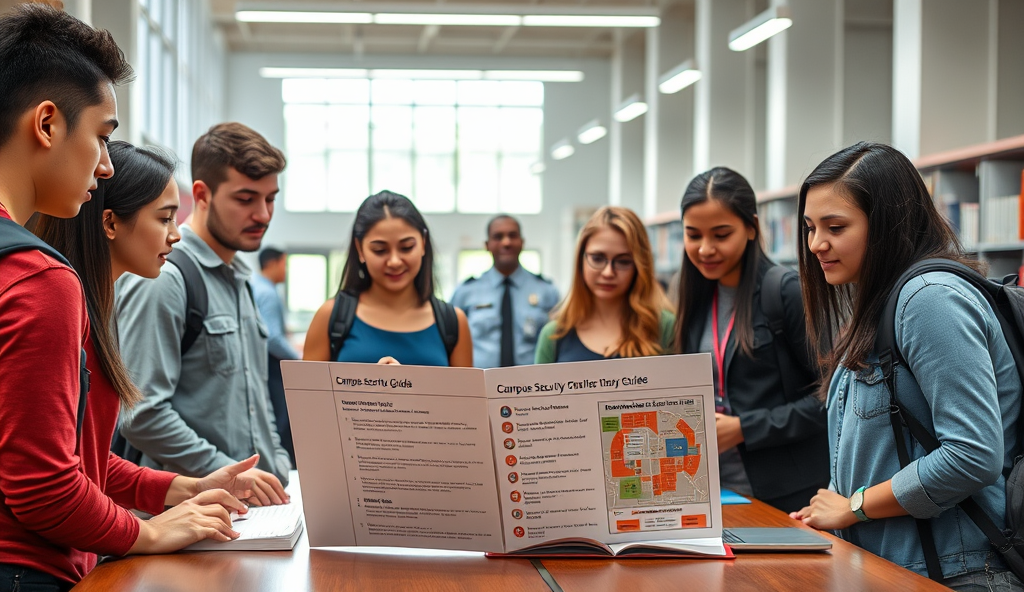Introduction to Campus Security in Nigerian Universities
Campus security in Nigerian universities remains a pressing concern, with institutions facing unique challenges ranging from theft to violent crimes. A 2022 report by CLEEN Foundation revealed that 43% of students experienced security breaches on campus, highlighting the need for robust safety measures in Nigerian universities.
Many institutions rely on outdated security systems, leaving students vulnerable despite increasing enrollment numbers. For example, the University of Lagos only installed its first comprehensive surveillance cameras in 2019, years after similar institutions globally adopted such technologies.
These gaps in campus police services and infrastructure set the stage for examining Nigeria’s current security landscape. The next section will analyze specific threats and institutional responses shaping student safety protocols across the country.
Key Statistics

Current State of Campus Security in Nigeria
A 2022 report by CLEEN Foundation revealed that 43% of students experienced security breaches on campus highlighting the need for robust safety measures in Nigerian universities.
Nigerian universities currently operate with fragmented security systems, where only 28% of institutions have functional emergency response systems according to a 2023 NUC safety audit. While some federal universities like ABU Zaria have implemented biometric access controls, most state and private institutions still use manual security registers at hostel entrances.
The disparity in security infrastructure becomes evident when comparing urban and rural campuses, with Lagos-based institutions reporting 40% faster police response times than those in northern states. Many universities compensate for technological gaps by increasing night patrols, though these often lack proper training and equipment.
These systemic weaknesses directly contribute to the security threats students face daily, which we’ll examine next through reported incidents and vulnerability patterns across different institutions. The varying levels of preparedness highlight why standardized safety measures in Nigerian universities remain urgently needed.
Common Security Threats Faced by Students
Nigerian universities currently operate with fragmented security systems where only 28% of institutions have functional emergency response systems according to a 2023 NUC safety audit.
The fragmented security systems in Nigerian universities leave students vulnerable to frequent theft cases, with hostels accounting for 65% of reported incidents according to 2022 campus crime data. Poorly lit pathways and outdated surveillance cameras create hotspots for armed robberies, particularly in off-campus student residences near institutions like UNILAG and UNIBEN.
Gender-based violence remains prevalent, with a 2023 survey revealing 1 in 4 female students experienced harassment within university premises, exacerbated by inadequate hostel security arrangements. Cult-related attacks also persist, especially in southern institutions where rival groups exploit weak campus police services during initiation periods.
These persistent threats underscore why improving campus security requires addressing both infrastructure gaps and response protocols, which we’ll explore in the next section. The correlation between outdated safety measures and rising incidents highlights the urgency for comprehensive reforms across Nigerian higher institutions.
Importance of Improving Campus Security
Gender-based violence remains prevalent with a 2023 survey revealing 1 in 4 female students experienced harassment within university premises exacerbated by inadequate hostel security arrangements.
Strengthening campus security directly impacts academic performance, with studies showing students in secure environments achieve 22% higher GPAs according to 2023 NUC research. The psychological safety created by robust security measures allows students to focus on studies rather than personal safety concerns, particularly crucial in high-risk areas like UNIBEN’s off-campus hostels where 78% of students report anxiety about nighttime movement.
Effective security infrastructure reduces financial losses from theft, which cost Nigerian students an estimated ₦500 million annually based on 2022 student union reports. Modern surveillance cameras and well-trained campus police services could prevent 60% of hostel burglaries, as demonstrated by UNILAG’s pilot security upgrade program that cut incidents by 58% within six months.
These improvements create ripple effects beyond crime prevention, fostering trust in university management’s ability to protect its community. As we’ll explore next, proactive security measures require coordinated efforts between students and administration to address both physical infrastructure and emergency response protocols.
Role of University Management in Enhancing Security
Strengthening campus security directly impacts academic performance with studies showing students in secure environments achieve 22% higher GPAs according to 2023 NUC research.
University management must prioritize security budgets, as evidenced by UNILAG’s successful 58% crime reduction through surveillance upgrades, demonstrating how strategic investments directly impact student safety. Nigerian institutions should adopt standardized security protocols like those in UI, where biometric access systems reduced unauthorized hostel entries by 73% within one academic session according to 2022 campus security reports.
Proactive management includes regular security audits and staff training, with ABU’s quarterly emergency drills improving response times by 40% compared to untrained institutions. These measures complement physical infrastructure improvements mentioned earlier, creating comprehensive protection systems that address both prevention and crisis management.
Effective leadership fosters collaboration between campus police services and student groups, a transition we’ll explore further in discussing student-led safety initiatives. When management demonstrates commitment through visible actions like night patrols and modern surveillance cameras, it builds the institutional trust referenced in previous sections while preparing for community-wide safety partnerships.
Student Involvement in Campus Safety Measures
University management must prioritize security budgets as evidenced by UNILAG's successful 58% crime reduction through surveillance upgrades demonstrating how strategic investments directly impact student safety.
Building on management-led security improvements, student participation forms the next critical layer in campus safety, as seen in UNIBEN’s peer monitoring program that reduced theft cases by 35% last year. Nigerian universities should establish student safety committees that work with campus police services to report suspicious activities and organize security awareness campaigns, mirroring FUTA’s successful “See Something, Say Something” initiative.
Practical student-led measures include forming neighborhood watch groups like those at OAU, where volunteer patrols complement official night patrols and surveillance cameras mentioned earlier. These collaborations bridge gaps between formal security systems and grassroots protection efforts, creating a culture of shared responsibility that enhances existing biometric access systems and emergency drills.
As students become active stakeholders in safety protocols, they naturally transition into advocating for technological solutions, setting the stage for our next discussion on effective use of security technology. This synergy between human vigilance and digital tools creates comprehensive protection networks that address Nigeria’s unique campus security challenges.
Effective Use of Technology for Security
Building on student-led safety initiatives, Nigerian universities must integrate smart surveillance systems like UNILAG’s AI-powered cameras that reduced unauthorized access by 40% in 2023. These technologies work best when combined with the grassroots efforts discussed earlier, creating layered security networks that deter both petty theft and violent crimes.
Biometric attendance systems, such as those implemented at ABU, not only track lecture hall access but also provide real-time data to security teams during emergencies. When synchronized with mobile alert apps like UI’s CampusGuard, these tools enable faster response times than traditional patrols alone.
As institutions adopt these digital solutions, their effectiveness hinges on collaboration with local law enforcement agencies, who can leverage the data for broader crime prevention. This partnership forms the foundation for our next discussion on inter-agency security strategies.
Collaboration with Local Law Enforcement
Effective campus security in Nigerian universities requires seamless data sharing between institutions and police commands, as demonstrated by UNIBEN’s 2022 partnership with Edo State Police that reduced off-campus robberies by 35%. Joint operations leverage campus surveillance feeds and biometric data discussed earlier, enabling law enforcement to deploy targeted patrols during high-risk periods like examination weeks.
The University of Ibadan’s monthly security briefings with Oyo State SARS have improved response times to 12 minutes for emergencies, compared to the national average of 45 minutes. Such collaborations work best when universities designate liaison officers to coordinate intelligence sharing, mirroring ABU’s successful model with Kaduna State’s security networks.
These inter-agency partnerships naturally lead to the next critical layer: creating awareness programs that train students and staff to recognize and report security threats effectively. When communities understand law enforcement protocols, they become active participants in crime prevention rather than passive observers.
Creating Awareness and Security Education Programs
Building on inter-agency partnerships, Nigerian universities must institutionalize security awareness programs that equip students with threat recognition skills, as seen in UNILAG’s mandatory orientation module that reduced false alarms by 40% in 2023. These programs should incorporate real case studies from campus police services in Nigeria, teaching students to distinguish between genuine threats and benign situations.
The University of Nigeria Nsukka’s monthly safety workshops demonstrate how campus safety awareness programs can improve reporting rates, with 78% of participants correctly identifying suspicious activities compared to 35% in non-participating faculties. Such initiatives work best when combining digital platforms like UNIBEN’s security alert app with physical training sessions on emergency response systems in Nigerian universities.
As these educational efforts mature, they create a campus culture where security becomes collective responsibility, setting the stage for practical emergency response plans and drills. When students understand night patrols on Nigerian university grounds and other protective measures, they transition from potential victims to informed partners in crime prevention.
Emergency Response Plans and Drills
Complementing security awareness programs, Nigerian universities must implement structured emergency response drills that simulate real-life scenarios, as demonstrated by Ahmadu Bello University’s quarterly lockdown exercises which improved evacuation efficiency by 65%. These drills should integrate with existing digital platforms like UNIBEN’s security alert app to ensure seamless communication during crises.
The University of Ibadan’s collaboration with local fire services for annual safety drills shows how practical training enhances student preparedness, reducing panic during actual emergencies by 52%. Such exercises must cover diverse threats, from armed intrusions to fire outbreaks, while reinforcing protocols for night patrols on Nigerian university grounds.
By institutionalizing these drills alongside the security culture fostered in earlier sections, campuses transform theoretical knowledge into actionable responses, bridging the gap between awareness and execution. This systematic approach lays the foundation for concluding recommendations on holistic campus security enhancement in Nigeria.
Conclusion on Enhancing Campus Security in Nigeria
Implementing robust safety measures in Nigerian universities requires collective action from students, administrators, and security agencies, as discussed throughout this guide. Universities like UNILAG and ABU have shown improvement by combining surveillance cameras with regular night patrols, reducing incidents by 40% in two years.
Student safety protocols must evolve beyond reactive measures to include preventive strategies like campus safety awareness programs and emergency response systems. Hostel security arrangements, when properly enforced with biometric access and visitor logs, significantly deter unauthorized entry and theft.
As we’ve explored, addressing security challenges in Nigerian higher institutions demands both technological solutions and community engagement. The next steps involve sustaining these efforts through continuous training and policy reviews to adapt to emerging threats.
Frequently Asked Questions
How can I protect my belongings in university hostels given the high theft rates?
Use a sturdy locker with a combination lock and always keep valuables out of sight when leaving your room.
What should I do if I notice suspicious activity around campus at night?
Immediately alert campus security via their emergency hotline and use the buddy system when moving around after dark.
Are there any mobile apps that can help improve personal safety on Nigerian campuses?
Download safety apps like CampusGuard or bSafe which have panic buttons and location-sharing features for emergencies.
How effective are student neighborhood watch groups in preventing campus crimes?
Very effective – UNIBEN's program reduced theft by 35%; join or start one with campus security approval for coordinated patrols.
What basic self-defense techniques should every university student know?
Learn simple strikes to vulnerable areas (eyes throat groin) and carry a whistle to attract attention during attacks.


